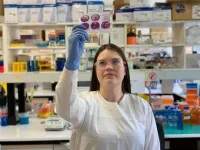(Press-News.org) Human health and ecosystems could be affected by microbes including cyanobacteria and algae that hitch rides in clouds and enter soil, lakes, oceans and other environments when it rains, according to a Rutgers co-authored study.
"Some of the organisms we detected in clouds and rain are known to have possible impacts on human health and could also affect microbial populations at rainfall locations," said lead author Kevin Dillon, a doctoral student in the lab of co-author Donna E. Fennell, a professor who chairs the Department of Environmental Sciences in the School of Environmental and Biological Sciences at Rutgers University-New Brunswick. "More work is needed to confirm that and to investigate specific impacts."
Scientists, for the first time, were able to grow green algae collected from clouds. Their study, a collaboration between Rutgers and a Université Clermont Auvergne team, is published in the journal Applied and Environmental Microbiology.
They collected cloud water at the summit of puy de Dôme, a mountain in central France, about 4,800 feet above sea level. They also collected rainwater below the mountain at about 2,230 feet above sea level. They detected blue-green (cyanobacteria), green, red and golden algae, as well as diatoms (another form of algae), and they grew green algae in the Chlorellaceae family in a lab.
Some of the microbes that hitched a ride in clouds may have come from the Atlantic Ocean. Others were likely from other parts of France that clouds passed over. Microbes in rain include those in a cloud and the air below it.
The airborne organisms could have important impacts on atmospheric processes and the ecosystems they enter after falling to Earth, the study says.
"Future work would involve identifying specific genes associated with the production of toxins by these organisms and trying to understand what could or would limit the growth of these microorganisms after they're transported into a new ecosystem by rain," Dillon said.
Bacteria and algae get rides in clouds
Microbes could pose health, ecosystem risks when rain brings them to Earth
2021-02-16
ELSE PRESS RELEASES FROM THIS DATE:
ASHP publishes reports exploring pharmacy's role in future of healthcare delivery
2021-02-16
BETHESDA, Md. -- ASHP (American Society of Health-System Pharmacists) today announced the publication of two landmark reports that articulate a futuristic vision for pharmacy practice, including expanded roles for the pharmacy enterprise in healthcare organizations. The 2021 ASHP/ASHP Foundation Pharmacy Forecast Report and the Vizient Pharmacy Network High-Value Pharmacy Enterprise (HVPE) framework, published in AJHP, outline opportunities for pharmacy leaders to advance patient-centered care, population health, and the overall well-being of their organizations.
"During these unprecedented times, it is more important than ever for pharmacy leaders to demonstrate the value pharmacy services contribute ...
High-tech start-ups benefit from Twitter hype
2021-02-16
The short message service Twitter has played a prominent role in US politics in recent weeks and months and attracted a lot of attention. Even in business, Twitter users' tweets are being closely followed and used as a basis for decision-making. A new study shows that venture capitalists can also be influenced by Twitter sentiment when valuing start-up companies from the high-tech sector. "However, the sentiment signals on Twitter say nothing about the long-term investment success of such a start-up. Patent applications, for example, are much better suited for this," said Professor Andranik Tumasjan from Johannes Gutenberg ...
Health survey conveys messages on how we should live
2021-02-16
Since the 1980s, the physical and mental health of Swedish children and young people has been measured by way of surveys. One of these is the international "Health Behavior in School-aged Children Survey" (HBSC), which is taken by 11-, 13- and 15-year-olds every fourth year during a class in school.
Researchers Anette Wickström and Kristin Zeiler at Linköping University wanted to study the survey to see which norms can be conveyed in health surveys, something that has rarely been studied. The results have been published in the journal Children & Society.
"The study shows that survey questions on parents' occupation and financial situation create norms about how you should ...
Asthma may heighten flu risk and cause dangerous mutations
2021-02-16
A subtype of asthma in adults may cause higher susceptibility to influenza and could result in dangerous flu mutations.
University of Queensland-led animal studies have found that paucigranulocytic asthma (PGA) - a non-allergic form of the condition - allows the flu virus to flourish in greater numbers in sufferers.
UQ PhD candidate Ms Katina Hulme said this was due to the asthma's suppression of the immune system.
"We were first tipped off about this during the 2009 swine flu pandemic," Ms Hulme said.
"Asthma was identified as the most common underlying medical condition in ...
How bacteria hunt bacteria
2021-02-16
These observations might be useful for the future development of new antibacterial strategies. The team reports in the journal Applied and Environmental Microbiology on 12 February 2021.
Bacterial groups in search of food
We commonly know predator-prey relationships from the animal kingdom, but they are also a survival strategy of certain bacteria: bacterial predators actively kill bacteria of other species in order to feed on them. The predatory species include many myxobacteria, which are widespread in the soil and display unique behavioural patterns: many cells assemble into large groups and go in search of food together or, in the event of nutrient ...
Hospital wastewater favors multi-resistant bacteria
2021-02-16
Scientists from the University of Gothenburg, Sweden presents evidence that hospital wastewater, containing elevated levels of antibiotics, rapidly kills antibiotic-sensitive bacteria, while multi-resistant bacteria continue to grow. Hospital sewers may therefore provide conditions that promote the evolution of new forms of antibiotic resistance.
It is hardly news that hospital wastewater contains antibiotics from patients. It has been assumed that hospital sewers could be a place where multi-resistant bacteria develop and thrive due to continuous low-level antibiotic exposure. However, direct evidence for selection of resistant bacteria from this type of wastewater has been lacking, until now.
A research group at ...
Ultrabright dots see beyond skin deep
2021-02-16
A polymer that is custom designed to produce light that penetrates murky environments has shown promise in bioimaging trials, where it can detect nano-sized particles underneath the surface of realistic tissue models.
Recent studies have demonstrated that fluorescent probes -- light-emitting materials that attach to tiny targets such as cells -- are particularly useful for bioimaging when they radiate in the shortwave infrared (SWIR) region of the optical spectrum. Because this type of fluorescent light penetrates deeper into biological objects without being absorbed or scattered, SWIR ...
Epigenetic mechanisms allow native Peruvians to thrive at high altitudes
2021-02-16
Humans inhabit an incredible range of environments across the globe, from arid deserts to frozen tundra, tropical rainforests, and some of the highest peaks on Earth. Indigenous populations that have lived in these extreme environments for thousands of years have adapted to confront the unique challenges that they present. Approximately 2% of people worldwide live permanently at high altitudes of over 2,500 meters (1.5 miles), where oxygen is sparse, UV radiation is high, and temperatures are low. Native Andeans, Tibetans, Mongolians, and Ethiopians exhibit adaptations that improve their ability to survive such conditions. Andeans, for example, display increased chest circumference, elevated oxygen saturation, and a low hypoxic ventilatory response, enabling them to thrive at exceptionally ...
TV and film 'thump' is not effective alternative to CPR, Warwick researchers demonstrate
2021-02-16
New study from Warwick Medical School examined the effectiveness of three alternatives to CPR, concluding that none were beneficial
First comprehensive systematic review of evidence on precordial thump, percussion pacing and cough CPR - all of which have fallen out of routine practice
Precordial thump is often portrayed in television and film, and cough CPR misinformation circulates frequently on social media - but neither are effective
Reaffirms CPR as the 'gold standard' technique when assisting someone experiencing a cardiac arrest
A technique frequently portrayed in dramatic resuscitation scenes in television ...
Can evolution be predicted?
2021-02-16
Scientists created a framework to test the predictions of biological optimality theories, including evolution.
Evolution adapts and optimizes organisms to their ecological niche. This could be used to predict how an organism evolves, but how can such predictions be rigorously tested? The Biophysics and Computational Neuroscience group led by professor Gašper Tkačik at the Institute of Science and Technology (IST) Austria has now created a mathematical framework to do exactly that.
Evolutionary adaptation often finds clever solutions to challenges posed by different environments, from how to survive in the dark depths of the oceans to creating intricate organs such as an eye or an ear. But can we mathematically predict these outcomes?
This is ...
LAST 30 PRESS RELEASES:
Stem cells from human baby teeth show promise for treating cerebral palsy
Chimps’ love for crystals could help us understand our own ancestors’ fascination with these stones
Vaginal estrogen therapy not linked to cancer recurrence in survivors of endometrial cancer
How estrogen helps protect women from high blood pressure
Breaking the efficiency barrier: Researchers propose multi-stage solar system to harness the full spectrum
A new name, a new beginning: Building a green energy future together
From algorithms to atoms: How artificial intelligence is accelerating the discovery of next-generation energy materials
Loneliness linked to fear of embarrassment: teen research
New MOH–NUS Fellowship launched to strengthen everyday ethics in Singapore’s healthcare sector
Sungkyunkwan University researchers develop next-generation transparent electrode without rare metal indium
What's going on inside quantum computers?: New method simplifies process tomography
This ancient plant-eater had a twisted jaw and sideways-facing teeth
Jackdaw chicks listen to adults to learn about predators
Toxic algal bloom has taken a heavy toll on mental health
Beyond silicon: SKKU team presents Indium Selenide roadmap for ultra-low-power AI and quantum computing
Sugar comforts newborn babies during painful procedures
Pollen exposure linked to poorer exam results taken at the end of secondary school
7 hours 18 mins may be optimal sleep length for avoiding type 2 diabetes precursor
Around 6 deaths a year linked to clubbing in the UK
Children’s development set back years by Covid lockdowns, study reveals
Four decades of data give unique insight into the Sun’s inner life
Urban trees can absorb more CO₂ than cars emit during summer
Fund for Science and Technology awards $15 million to Scripps Oceanography
New NIH grant advances Lupus protein research
New farm-scale biochar system could cut agricultural emissions by 75 percent while removing carbon from the atmosphere
From herbal waste to high performance clean water material: Turning traditional medicine residues into powerful biochar
New sulfur-iron biochar shows powerful ability to lock up arsenic and cadmium in contaminated soils
AI-driven chart review accurately identifies potential rare disease trial participants in new study
Paleontologist Stephen Chester and colleagues reveal new clues about early primate evolution
UF research finds a gentler way to treat aggressive gum disease
[Press-News.org] Bacteria and algae get rides in cloudsMicrobes could pose health, ecosystem risks when rain brings them to Earth




